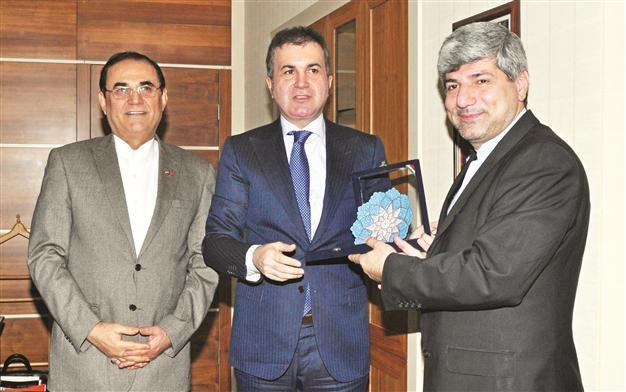Turkey and Iran play down Patriot tension
ANKARA - Hürriyet Daily News

AKP Deputy Chair Çelik (C) and Iranian Foreign Ministry Spokesperson Mehmanparast (R) meet in Ankara.AA photo
Turkish and Iranian officials downplayed recent tension between their countries yesterday, underlining a need to focus on the big picture and improving regional cooperation rather than conjectural problems.The meeting between the ruling Justice and Development Party (AKP) Deputy Chair Ömer Çelik and Iranian Foreign Ministry Spokesperson Ramin Mehmanparast at the AKP’s headquarters was the first high-level meeting between the neighboring countries’ officials following the tension stemming from NATO’s planned deployment of Patriot missiles in Turkey.
The officials discussed a wide range of regional issues, including the deployment of Patriot missiles as well as bilateral issues, Çelik told reporters following the meeting.
Politicians must ease ‘sensitive’ process
“We are always saying this: there may be some conjectural problems between Turkey and Iran, but this doesn’t blemish the picture. We always look at the big picture,” Çelik said, expressing pleasure over Mehmanparast’s visit and promising his first visit abroad on behalf of the AKP would be to Iran upon an invitation by Mehmanparast.
For his part, Mehmanparast said the region was going through a “sensitive” process.
“We definitely need the cooperation of two big countries of the region, Iran and Turkey, to resolve the problems of the region,” he said, adding that certain sensitivities among public opinions of the two countries should be eased by politicians.
“Additionally, we talked about how we should take the region’s people’s rights and stability as a basis for resolving the problems of the region. Zionist regime and its supporters definitely don’t want good relations in our region and between the regional countries. Turkey and Iran are in strategic cooperation. We should definitely provide stability and peace in our region in cooperation with each other,” Mehmanparast said.
Tensions between Iran and Turkey spiked in the wake of NATO’s decision to deploy U.S.-made missiles along the Turkish-Syrian border in case of an attack emanating from Syria.
But both Russia and Iran, the most powerful allies of Syrian President Bashar al-Assad, oppose the move, fearing it could spark broader conflict.
Relations between Iran and Turkey, a fierce critic of the Damascus regime, have been strained over the 21-month conflict in Syria. Some Iranian officials have accused Turkey of arming Syrian rebels, charges repeatedly rejected by Ankara.
















